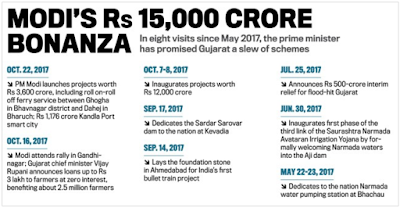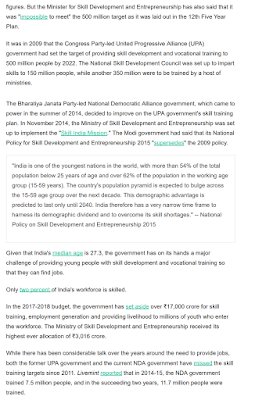- BJP's formidable election machinery and Prime Minister Narendra Modi would see them through. One of the farmers shot back: But he's not going to lead the Gujarat government. The rest of the group nodded their heads in silence. It is this silence that is worrying BJP.
- BJP's worry is reflected in Modi's eight trips to Gujarat in the past five months. Like an indulgent parent making up for his absence, Modi has been on a gifting spree. He has announced or inaugurated projects worth over Rs 20,000 crore, not counting the Rs 1.1 lakh crore Ahmedabad - Mumbai bullet train for which the foundation stone was laid on Sep 14. The Sardar Sarovar dam project dedicated to the nation and also the inauguration of the first phase of the Rs 615 crore roll-on, roll-off ferry service between Ghogha and Dahej.
- Calling Gujarat elections the mother of all battles for both the BJP and the Congress would not be a misnomer.
- Anti-incumbency will play a part for BJP has been in power in the state for 22 years.
- There is the discontent over the Centre's twin economic moves - demonetisation and the GST.
- Opinion Poll in all 182 constituencies of the state shows the BJP bagging 115 - 125 seats and Congress winning 57 - 65 seats. But on the ground, the mood is less upbeat.
- Rahul Gandhi has seen impressive crowds at his rallies and has successfully tapped disenchantment with the big bang reforms. The BJP strategy has been to carpet-bomb the electorate with development rhetoric. This rhetoric will be lost on the nearly five million first-time voters born after 1995 who have no memory of a time when the Congress ruled the state.
- For the Congress, a fourth consecutive loss in Gujarat will only add to its declining fortunes. But winning could reinvigorate the party ahead of the multiple state elections due in 2018 and the 2019 Lok Sabha polls.
- While the BJP has a 48% vote share and the Congress 38%. A 6% swing in the Congress's favour could upset the BJP applecart.
- Clearly the BJP isn't getting the state on a platter this time. This time, it looks like it has its back to the wall, says a political analyst.
- Congress offered tickets to the three young Turks - Patidar agitation leader Hardik Patel, emerging Dalit icon Jignesh Mevani and OBC leader Alpesh Thakore. Thakore had become a hero in his community by running an anti-liquor reform movement under the banner of the Gujarat Thakore Sena.
- Rising prices and the problems caused by the GST are troubling the BJP in many pockets, with the party not doing enough to remove the doubts of the small businessmen.
- BJP will have to drop at least a third of its 120 MLAs, particularly the Patel MLAs targeted by Hardik. Though Patels are only between 12-15% of the electorate, there are 44 BJP Patel MLAs and 10 Patel ministers.
- On Oct 9, Rahul Gandhi delivered a moving speech which drew quite a favourable response. He spoke out against the BJP's highhandedness, manifested in slogans like 'Congress mukt Bharat'. Everyone has a right to be in politics. Why should anyone think of erasing others from politics? We in the Congress never think in such negative terms.
- The impressive turnout in Rahul Gandhi's meetings could be an indicator of the public mood, showing that the public disapproved of the politics of defection played by the BJP.
- Congress party even though lacks a strong state leader to counter the Modi aura sees a glimmer of hope of victory in the absence of Modi from the state and the growing discontent with the BJP.
- The Congress has also played up the tanashahi charge against the BJP. Hardik Patel was jailed in 2015 for 'waging war against the state' and banished from Gujarat. The case of a businessman and party ticket contender after being threatened skipped a meeting with Rahul Gandhi. Such high-handedness is only going to strengthen the resolve of the people to throw the BJP out. The state government is insensitive and high-handed.
- A combination of agrarian stress and the Hardik-led popular movement may dent the BJP's Patel vote bank that swept it to power in 1995.
- Congress party's social media team racked up some impressive successes against the BJP - a Vikas Gando Thayo Chee (Vikas Gone Crazy) campaign lampooning the vikas plank.
- The real challenge for the Congress is to woo the urban voter. Issues like water, electricity, and the struggles of farmers or tribals don't exist in the cities. In 2012, the BJP managed a near-clean sweep, winning 42 of the 46 seats in 6 cities.
It would better for India, if Congress wins in Gujarat. Then at least Modi will regain senses and rule the nation democratically shedding his dictatorial tendencies. This guy is behaving like erstwhile Nizam of Hyderabad and is unacceptable in this 21st century. He must be dumped in 2019 elections into trash bin.


























